It’s almost Halloween, so for this episode of Uncanny Japan I’m going to tell you a spooky tale called Yotsuya Kaidan, the story of Oiwa and her sad and vengeful ghost. The last ghost story I told here was in episode 25, Okiku and the Nine Plates (Bancho Sarayashiki). Well, Yotsuya Kaidan’s main character, Oiwa, is another one of the biggies, who I’m guessing is even more well known than Okiku. There are so many versions of this story, so here I’m going to tell you mine. I’m going to try and stick to the originals as much as possible without getting too complicated and character heavy. I do encourage you to look into other versions of the story if you’re interested. There are so many adaptations out there.
So go climb into bed, put on your headphones, turn out the lights, and let me tell you the story of Oiwa’s ghost.
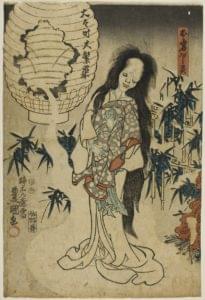
Hey hey, everyone, it’s late October, almost Halloween and I’m in a spooky mood, so for this episode of Uncanny Japan, I’m going to tell you a ghost story. This is one of the biggies here. Remember I told you about Okiku and the Nine Plates back in episode 25. Well, today’s ghost, Oiwa, is just as if not more well known than our poor Okiku. Maybe you’ve heard of it, in Japanese it’s called Yotsuya Kaidan.
I’ve said this before about other stories, but it holds up here as well. Yotsuya Kaidan is truly one of those tales where the bones of the story are so good you can riff off it endlessly and it still holds up. There have been so many movie, stage, and TV adaptations that I couldn’t even come up with a good number, so let’s settle for a lot. I’ve seen a couple of the old movies and even went to see the latest interpretation by Miike Takashi, called “Over Your Dead Body” the day it came out in theaters years ago. And I can attest, the story really seems to hold up no matter what slant you put on it.
Today I’m going to tell you my interpretation, but instead of elaborating or bringing in any new elements (which is what I really want to do), I’m going to, as best as I can, stay close to and honor the originals, while not going to much into the weeds as far as characters and intrigue go. Also a kabuki play, Yotsuya kaidan can become quite complicated at times.
So I hope you’re tucked into bed, headphones on, all the lights turned out, one candle lit on your bed stand, oh, and did you lock your doors?
The story begins after dark on an empty dusty road with Iemon, an out of work masterless samurai, or ronin, on his knees in front of his father-in-law Yotsuya Samon. Samon is disgusted with Iemon who cannot take care of his daughter, Oiwa, in the manner he feels she deserves. While Iemon begs, Samon demands that they separate so the daughter he loves so much can have a better life. Iemon refuses. Samon then ridicules Iemon, telling him he isn’t a real samurai, not even a real man. He is an embarrassment.
Iemon snaps. With one quick move he stands, draws his sword and cuts his father-in-law down in the street. Nobody is around to witness his act.
Iemon then returns to Oiwa telling her something horrible has happened. Her father has been ruthlessly murdered. The young woman breaks down sobbing. She is heartbroken. She lost her mother to disease several years ago and now this. Iemon, though, comforts his young wife. He says he has heard rumor that the murderer has fled to a nearby town and that they should follow, so Iemon can avenge her father’s death.
They quickly pack and with Oiwa’s faithful servant, Kohei in tow, the three head out on their long journey.
Once there, Iemon and Oiwa start a new life. Though Iemon still cannot find work, Oiwa quickly gets a job in a teahouse to support them both and continue retaining the kind Kohei who she has great fondness for and thinks of as a little brother. While she works and Kohei keeps the house in order, her husband goes out daily, making the rounds, telling the story of his father-in-law’s vicious murder and boasting his vow of revenge.
After several weeks, Iemon meets a very rich and very old doctor named Ito and his lovely granddaughter Oume. It isn’t long before the entire Ito family are taken in by Iemon’s charms. They believe his front of courage and honor. Soon Oume falls in love with Iemon and wishes to marry him. The old Itoh much like Oiwa’s deceased father, Samon, loves his granddaughter dearly and wants to give her what she desires. Daily he shows Iemon the rich and easy life he can have if Oiwa was out of the picture and he is free to marry his granddaughter, Oume.
This goes on, Iemon spending his days with the Itos in their sprawling manor, only to return nightly to his cramped little house where Oiwa is waiting with a modest hot meal and conversation. Iemon is increasingly ill-tempered, imagining a better life with Oume.
One night Oiwa pours his hot sake, excited to tell him a secret she’s been keeping. Instead, though, when she asks about his day, Iemon loses his temper and begins blaming her for their living conditions, for not working hard enough, keeping on the retainer Kohei when they barely have enough to eat between the two of them. It is because of her, he has such a wretched life. Oiwa tries to calm her husband, thinking he’s just upset about still being unable to find work and not yet discovering her father’s murderer. He calms down somewhat and she kneels before him, thinking the time is right, and reveals her secret, knowing that he has always wanted a son. She tells him that she is pregnant.
At the news, Iemon flies into a rage and storms out of the house and straight to the Ito manor. It’s late, but he consults with the old doctor about his plight. How can he separate from Oiwa now that she’s pregnant? But the two converse long into the night and come up with a plan. Before Iemon returns home, the old doctor goes into his room and returns with a folded piece of washi paper.
When Oiwa is feeling ill or tired from her pregnancy, slip this into her tea and have her drink it all, he says. Tell her it’s a tincture to help her regain her strength. After she drinks it, we will have no more worries about Oiwa or her child.
Days go by with Oiwa working, offering no complaint, and showing no fatigue at all. Iemon continues his visits to the Ito household to court Oume and enjoy the lavish life they have to offer.
However, one day when out on errand Kohei notices Iemon is acting strangely and follows him to the Itoh household where he witnesses the infidelity. He overhears Iemon and the old doctor confiding about past deeds as well. Kohei hurries to Oiwa’s teahouse to inform her of what he’s learned. He encourages her to leave Iemon, the two of them can run away and he will help her raise the child. But Oiwa still loves her husband and doesn’t want to believe what she’s been told.
But she must ask. That night again sitting on the straw matted floor, Oiwa pouring cup after cup of sake for her husband, she mentions that she’s heard a rumor at the teahouse. Iemon drunk and indignant asks what that rumor might be. Oiwa tells him, hoping that he will deny it, promise her the affair isn’t true and that he only loves her. But that isn’t what happens.
Iemon instead laughs, pushing himself up, unsteady on his feet, why of course he’s having an affair. Oume is young and beautiful and rich. That is the life he deserves. Oiwa collapses, heartbroken once again. She cannot bring herself to believe his betrayal. Iemon stumbles over to Oiwa’s vanity mirror and starts pulling out the drawers and emptying them on the floor. His words slurring from drink, he bellows that he will go to Oume tonight, that she will welcome him, but he must bring her a gift, something lovely. That’s when he finds the beautiful tortoise shell comb. This. He holds it up.
Yamete, stop! Oiwa begs. Not that. It’s my mother’s comb. It’s all I have to remember her by. The two struggle. Kohei enters the room after being woken, to find that Iemon has passed out on the floor, Oiwa holds the comb to her breast and sobs. Kohei was right.
The next day indeed Oiwa was not feeling well. The knowledge of her husband’s affair, her thought of raising a child alone. She can’t even return to her parents for help. They were both dead. Iemon still hadn’t even found who had murdered her father. So Oiwa stayed in bed all day. In one hand she clutched tight her mother’s tortoise shell comb, while with the other hand she gently rubbed her growing belly.
Iemon didn’t leave the house that day. He stayed by her side, contrite and acting kindly. Nothing was said of the previous night or her husband’s lover. Oiwa seemed to soften to him again. Kohei, however, was still suspicious. Iemon waited until after nightfall to act out his plan. He brewed his wife another cup of tea, but this time he withdrew the folded paper from his long sleeve and sprinkled into the drink.
Kohei asked was it was and Iemon recited what the old doctor had told him. It’s a tincture to help her regain her strength, he said. Be sure to drink it all down.
Oiwa did as directed and immediately cried out. Kohei rushed to her side. Oiwa writhed in pain, moaning then screaming out when the pain got to much to bear.
What did you give her? Kohei demanded. Iemon stood over the two and refused to answer. You! Kohei spat, putting it all together. The whispers he’d heard when leaving their old home, the whispers he’d heard since coming here, even while hiding behind the paper windows of the Itoh house. You haven’t found Oiwa’s father’s murderer because you aren’t looking for him. It was you who killed Yotsuya Samon!
Iemon laughed. Oiwa stilled long enough to push herself up from her futon and make eye contact with her husband. He nodded and she understood then, finally, what kind of man he was.
“How could you betray me so? How could you. How could you do this? I will never forgive you. I curse you. You will never be free of me.”
Oiwa cries out again in pain, this time grabbing at the right side of her face as she thrashes about. Iemon looks on and laughs. Oh, I will be free of you soon enough.
Kohei leaps to his feet to attack the man, but Iemon draws his sword and slices him through. Kohei crumbles to the floor. Iemon wipes his blade. “It looks like I caught my wife having relations with another man. No one could possibly find me guilty for this act of passion.” He strides out of the house confident he will now live the life he deserves.
Oiwa is utterly broken. She suffers alone, her retainer and friend Kohei dead at her feet, the poison eating her insides, her beloved child fading. I will take revenge on you, Iemon. No, you will never be free of me.
Oiwa crawls over to her vanity mirror, the tortoise shell comb still in her hand. She sits down and seeing her reflection screams. Her long hair is wild and tangled about her head. The right side of her face is red and raw, her eye drooping.
I will go to the Ito household. I will tell them what kind of man Iemon is, Oiwa says. But I must make myself presentable. I cannot go like this.
She takes the tortoise shell comb and combs a long lock of hair, but the hair falls out in a bloody clump. No! Oiwa wimpers. She combs again and again, but every time her once long beautiful hair comes out in handfuls of tangled mess. Oiwa slides to the floor, cursing Iemon, as she takes her last breath.
The following morning Iemon arrives back at the house with men in tow. When they see the state of Oiwa all of them gasp in horror. Iemon exclaims that she was having an affair and for them to take one of the wooden shudders from the windows and nail Kohei’s body on one side and Oiwa’s on the other and then toss it into the river. To which the men obey.
Iemon believes he is free of his wretched wife and servant. His life takes an upturn and with much ceremony he marries the beautiful and rich Oume. That night they retire to the bedroom chamber, a room more luxurious than Iemon had slept in in a long time. One andon oil lamp is lit by their futon on the floor. Oume yawns and says how tired she is from the long day. She turns her back on her new husband as if to sleep. Iemon begins to stroke her long hair, telling her that they are finally man and wife, this is what they had wanted all along. Would she please turn over. Yes, husband, she says.
But when she does, in the dim flickering light of the oil lamp, Iemon sees she is not the beautiful Oume but Oiwa with her hideous face and drooping eye. He pulls away and tangle of her hair in his hand. He yelps in fright, reaches for his sword, and strikes the cursed face. A woman’s scream. Iemon feels dizzy, possessed. He shakes his head, clearing his vision. It is not Oiwa but Oume now that lies cut and bleeding on the futon.
No, no no! Iemon calls out, he hears the laughter of Oiwa nearby, urameshiya, “I curse you. You will never be free of me. Oiwa’s face is reflected in the lamp nearby. He leaps from the bed, sword in hand and runs down the long hall to his father in laws room. He bangs on the door. Something terrible has happened, he says. The door opens only to reveal Oiwa again standing their in her nightclothes, disheveled hair, falling out, her hideous face. You betrayed me again and again and again. You will never be free of me.” The apparition then throws her head back and cackles. Iemon terrified to the bone, again raises his blade and brings it down. Oiwa crumbles. But when Iemon looks upon the fallen body, it is not Oiwa, but his father in law, dead.
Iemon spends the rest of his days, short as they were, trying to escape the ghost of his murdered wife. But he finds no respite. Oiwa’s ruined face is everywhere, even the smoke from fire turns into her long main of hair. Iemon flees the town thinking if he is away from people, she cannot appear in their faces. There are several days where he thinks he has finally escaped her.
That is until one day when hungry he decides to go fishing. Thinking he has hooked a large fish, Iemon wades out into the river, pulling hard on the line. Only to discover he has hooked the wooden shutter with Kohei and Oiwa’s body’s nailed to either side.
Iemon screams falling to his knees. As the corpse of Oiwa turns her head and glares. You will never be free of me.
The end
If you’re as intrigued in the story as I am, I encourage you to look around for different versions, either written down, or in movie form. It’s fascinating to see the different takes on the tale. I just saw one where Iemon was a bit of a mama’s boy and she was the one who had her hand in making him leave Oiwa for Oume and every bad decision he made. Until he stood up to her, that is, but by then it was too late by then.
But don’t go looking too hard for her history. There’s another thing about her story that is both fascinating and frightening. It’s believed to be cursed. While the real Oiwa is said to have died in 1636, the rumor is her angry spirit or onryou is still around. Throughout the years, there have been many mysterious accidents and even deaths that have occurred to those involved in theater, film, and television adaptations of her story. The superstition is so prevalent that nowadays when anyone wishes to put on a production about Yotsuya Kaidan and Oiwa’s sad, horrible fate, they visit her grave or one of the shrines dedicated to her to pay respects and give some kind of offering. I don’t know how superstitious you are, but it is said that if you visit her grave out of curiosity, your right eye will become swollen and droop like hers.
One last piece of trivia is that even recent J-Horror flicks from The Ring to Juon have scenes in the movies to pay homage to Oiwa. If you watch closely you’ll spot them.
Today’s background music bed and sound design was brought to you by my son, Julyan. If anyone’s interested in his work for their own podcasts or whatever, shoot me a message. If you like these kinds of stories, I do them monthly for $5 and up Patrons, although not always scary, there are all kinds of tales depending on my mood.
Thank you all for listening, supporting, reviewing, messaging, emailing and spreading the word about Uncanny Japan. I’ve got some I will talk to you again real soon.
Credits
Intro and outro music by Julyan Ray Matsuura

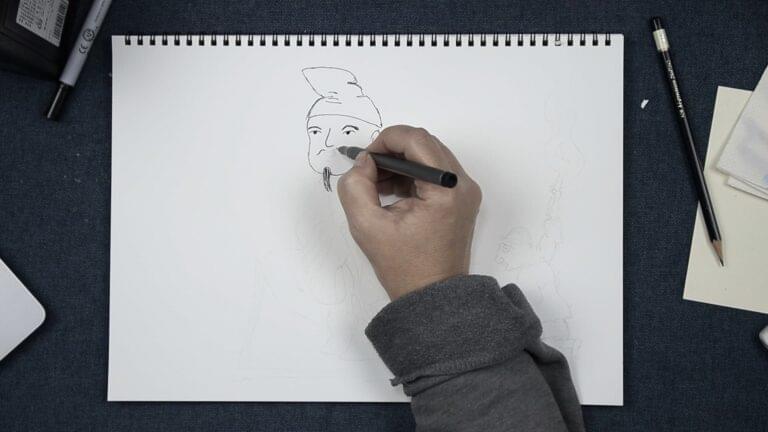
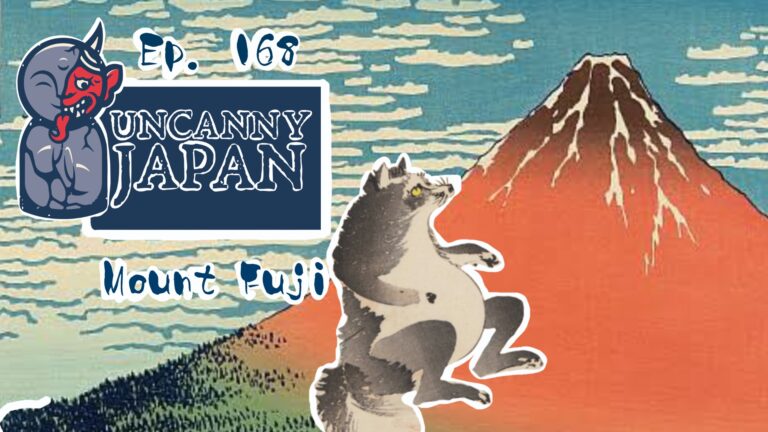
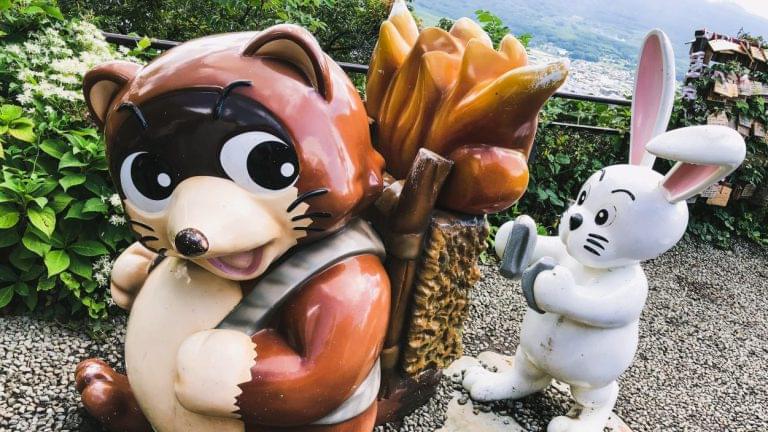
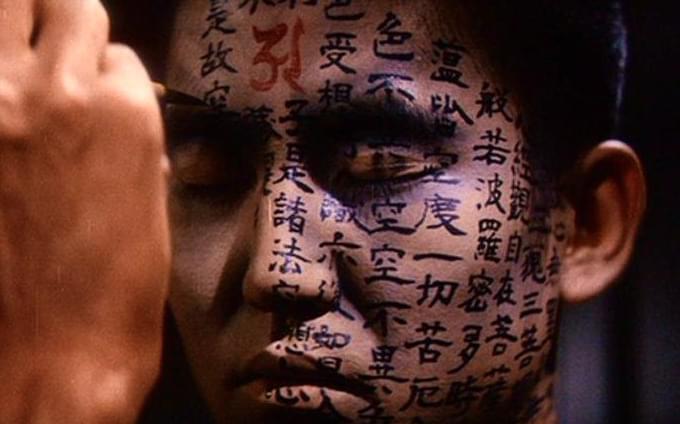


Thank you for your wonderful podcast on Yotsuya Kaidan. It’s a coincidence that I happen to watch “Over My Dead Body” just last night before listening to your podcast today. I wasn’t completely taken by Miike’s juggling of the ghost-story play with the actors’ off-stage lives. However, your podcast adds a lot to my appreciation of what Miike was attempting to convey in the film. Wishing you all the best. I look forward to every episode of “Uncanny Japan.”
Curt, thank you for listening. I remember going to see that so long ago and also having mixed feelings. I need to watch it again, I think. But then again, there are so many old movies that have their own take on the tale, I might just go through those.
[…] to the episode of the Thersa Matsuura’s Uncanny Japan podcast embedded below. You can also click here to read a full transcript of the episode on the Uncanny Japan […]